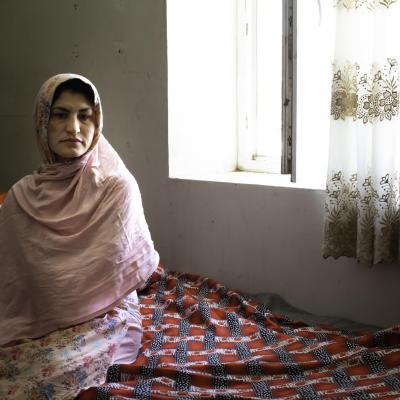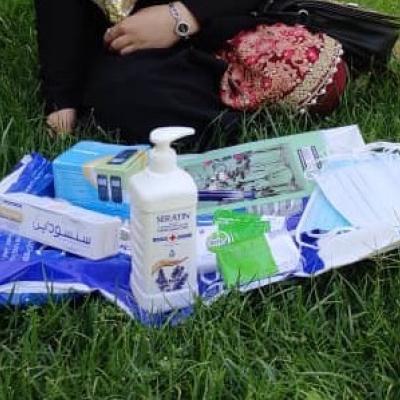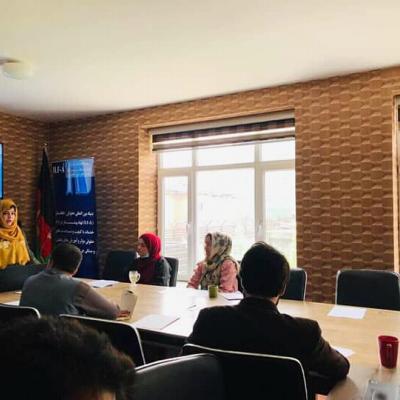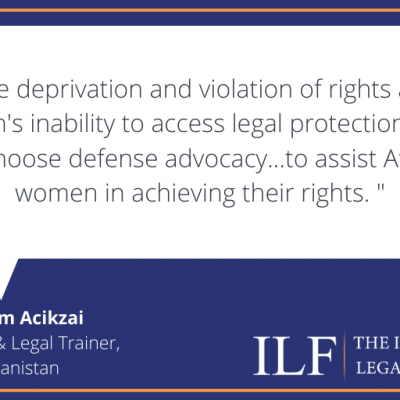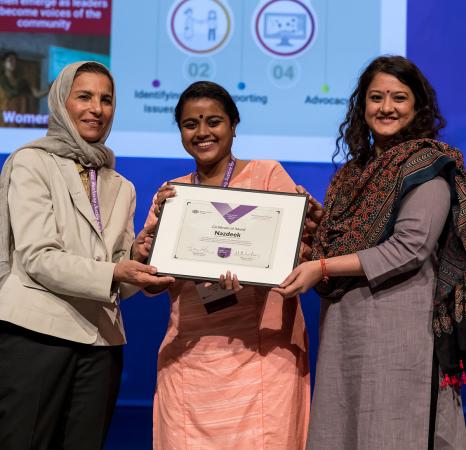Project Pitch and Q&A
Watch The International Legal Foundation's World Justice Challenge project pitch (and join WJP's World Justice Challenge 2021 Community Forum to ask questions to project representatives, explore additional resources, meet new colleagues, and more. Join the discussion and help us build stronger rule of law values, institutions, and communities around the world.
Ask your question at the Community Forum
Project Summary
This project seeks to ensure that formerly incarcerated women and girls in Afghanistan—including hundreds released pursuant to COVID-19 amnesty decrees—are provided with a safe and successful transition to their communities. Women in Afghanistan faced unfair prosecution and incarceration and high levels of gender-based violence even before COVID-19, and have been further marginalized and threatened during the pandemic. This project will improve the life circumstances of women and girls released from prison by ensuring they have safe housing, and by assisting them with any corollary legal needs, including divorce or child custody, medical, psycho-social, or other critical needs.
Problem Statement
The COVID-19 crisis uniquely impacted women and girls in contact with Afghanistan's criminal justice system, exacerbating gender-based vulnerabilities. World Prison Brief data shows that Afghanistan's female prison population increased by 44% over the past decade, growing from 566 in 2010 to 814 in 2020. The coronavirus pandemic put the health and safety of these incarcerated women at risk. Following high-level advocacy from the ILF in spring 2020, the Afghan government agreed to release more than 22,000 people from dangerous and overcrowded prisons to prevent the spread of COVID-19. Among them were hundreds of women and girls. It immediately became clear, however, that release from prison would put many women and girls in an even more dangerous situation at home. They faced severe hardships due to COVID-19, threatened by a shadow pandemic of domestic violence and femicide.
At least half the women imprisoned in Afghanistan are charged with so-called moral crimes, often related to leaving environments of domestic and intimate partner violence. Gender-based discrimination in Afghanistan makes women and girls vulnerable to violence and abuse in the home and their community. Instead of receiving support, survivors find themselves facing prosecution. Once associated with these alleged crimes, social stigma heightens their vulnerability to retaliation and more violence. These issues are exacerbated when women are discriminated against based on intersecting identities, including ethnicity, class, ability, and others. Upon release from prison, these women need a safe place to live and help with seeking divorce from abusive spouses, regaining child custody, obtaining mental health services, and finding employment. Unfortunately, many shelters in Afghanistan bar women who have been in conflict with the law. The ILF launched a gender-responsive reentry program in May 2020 for formerly incarcerated women and girls to better meet their justice needs and address these problems of gender-based violence and discrimination.
Project Description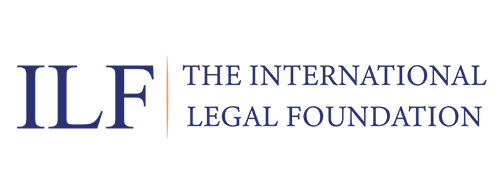
The ILF's advocacy in response to the COVID-19 pandemic resulted in broad amnesty decrees and secured the release of over 22,000 prisoners in Afghanistan, including hundreds of women and girls. Recognizing the unique challenges facing female clients, we trained all 54 of our lawyers working across 23 provinces in gender-responsive reentry planning, including how to provide holistic support upon release. International experts trained Afghan lawyers to identify areas of vulnerability and to use a client-centered approach to develop a reentry plan, make referrals, and secure other resources based on clients' self-identified needs. We ensured that our lawyers spoke with their clients and arranged for emergency services upon release, such as shelter access and transport. Lawyers assisted with urgent family and civil law matters, and they were also trained to make referrals for medical, mental health, and trauma-related services. The ILF also distributed release packages to women, including items like cell phones, masks, hand sanitizer, and feminine hygiene products.
From May to December 2020, the ILF provided comprehensive legal aid and reentry services to over 150 women and girls in 15 provinces (Badakhshan, Balkh, Baghlan, Daikundi, Farah, Ghazni, Helmand, Herat, Jawzjan, Kabul, Kunduz, Laghman, Nangarhar, Samangan, and Sar-e Pol), and this number has grown in 2021. The majority of female clients released were Tajik; the second largest group were Pashtuns. We also assisted Hazara and Uzbek women. The ILF helped women divorce abusive spouses, win custody of their children, secure mental and physical health services, find employment, and protect themselves and their families from COVID-19. We provided mobile phones with reentry packages so women could contact their lawyers if they were exposed to violence or needed additional services.
Through this project, Afghan women and girls now lead in making decisions about the support they need upon release from prison and are empowered through information and advice. This effort has been enormously effective in providing formerly incarcerated women and girls with resources and community-level support. Particularly innovative in the Afghan context was the idea that women and girls should be given agency over their own decisions and engaged in conversations about what they want for their futures. Discussions addressed gender-based violence, discrimination and harassment, mental health and trauma, physical health, addiction, economic security, trafficking, child marriage, child care, and other issues. The project also informed women and girls about COVID-19, including current government restrictions and how to protect themselves and stay healthy.
Project Impact and Potential for Scaling, Replication, and Sustainability
This project has resulted in a major shift in how Afghan lawyers think about and support their female clients. To scale this project to address the lack of services currently available to women and girls in conflict with the law and challenge systemic discrimination, the ILF is working with a range of Afghan government and civil society partners. We seek to address the stigma formerly incarcerated women and girls face and to expand the resources and services available to them upon release.
The ILF is negotiating with the Ministry of Women's Affairs to map public and private services available to formerly incarcerated women and girls, establish a referral system, and train relevant stakeholders. We plan to hold a series of roundtables to raise awareness of the unique challenges faced by women and girls in conflict with the law, develop a comprehensive list of reentry services, and ensure mechanisms for access. Meanwhile, we are strengthening referral partnerships with civil society organizations to connect female clients with vital services. The ILF is hiring social service workers to assist clients by liaising with government and community entities. Rather than focusing solely on criminal representation and courtroom advocacy, this holistic approach to legal aid recognizes broader social problems and the importance of skillfully addressing clients' underlying needs.
This project is uniquely sustainable given the ILF's placement as Afghanistan's leading legal aid provider, trainer, and technical advisor. The Ministry of Justice has committed to strengthening Afghanistan's legal aid system and establishing an independent Legal Aid High Commission and Secretariat through a joint SDG16 Acceleration Action with the ILF. A key aspect of our collaboration involves ensuring equal access to justice and addressing systemic discrimination against women.
In terms of further replication, the ILF has projects throughout Asia and beyond, incorporating our signature model of intensive mentoring and sharing best practices. We also plan to bring these learnings into the international legal aid network that we have spearheaded, which brings together legal aid providers from around the world. Just as we have piloted and replicated successful juvenile defense and pretrial motions practices across diverse jurisdictions, we believe combating discrimination through holistic defense services and robust reentry support for women and girls can be adapted for other geographies and contexts. It is vital to replicate this approach piloted during the COVID-19 emergency in order to build better, fairer justice systems for women and girls around the world.
Featured Resources
- The Washington Post: "In Male-dominated Afghanistan, Justice for Women is Complicated" (Jun 2019 - PDF)
- Gender Alert on COVID-19 Afghanistan (PDF)
- Open Justice Highlights (PDF)
Key Project Links
Social Media: Facebook, Twitter, LinkedIn
Website: theilf.org
Submit Your Questions and Get Ready to Pick a Winner!
Representatives of World Justice Challenge 2021 finalist projects are on hand to answer your questions. Join our online Community Forum to engage with finalists, share resources, and network with other members of the rule of law community. Submit your questions now and get ready to vote for your favorite project—voting opens in mid-April!
Join the Conversation
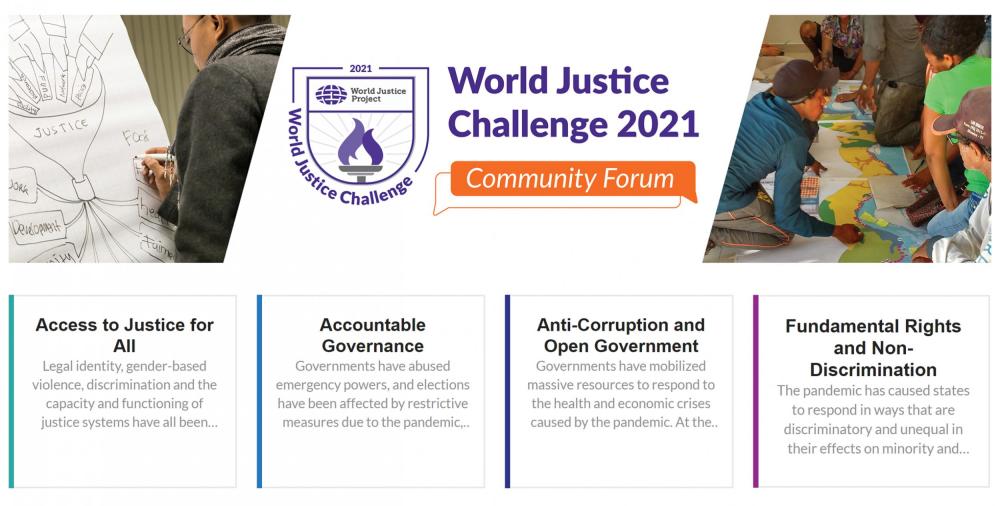
Program Photos
(Click to expand)
